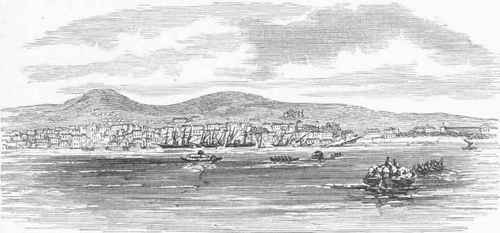Mytilexe, Or Mitylene
Description
This section is from "The American Cyclopaedia", by George Ripley And Charles A. Dana. Also available from Amazon: The New American Cyclopędia. 16 volumes complete..
Mytilexe, Or Mitylene
Mytilexe, Or Mitylene (anc. Lesbos), an island of the Grecian archipelago, belonging to Turkey, separated from the coast of Asia Minor by a strait from 7 to 10 m. broad; area, 276 sq. m.; pop. previous to the Greek revolution, 60,000, since reduced to less than 40,000. On the south it is indented by two deep bays called Ports Caloni and Iero, the former extending to the centre of the island. Both have very narrow mouths, and expand as they stretch inland. The surface is diversified by wooded hills and beautiful plains; the soil is fruitful, and the climate salubrious, but the means of irrigation are imperfect. The principal products are olives, wine, fruit, silk, cotton, and pitch. The chief town is Castro, or Mytilene, on the E, coast, which receives considerable business as a port on the steamboat route to Constantinople. The principal merchants are Greeks. The town was considerably damaged by an earthquake in 1867. - The ancient Lesbos was one of the islands of the Aeolians, and at a very early period contained several rich and populous cities, of which Mytilene and Methym-na were the most important, on account of their fine harbors for the coasting trade.
After the island had undergone several revolutionary changes, Pittacus about 600 B. C. usurped the dictatorship, restored order, and laid the foundation for the future greatness of the city of Mytilene. While continental Aeolis became subject to Persia about 550 B. C, Lesbos maintained her independence several years longer. About 500 it joined the revolt of the Ionians, but without success. After regaining its independence it became a member of the Athenian confederacy in 477, but revolted in the beginning of the Peloponnesian war, 428, and once more in 412, both times suffering severely. With the exception of a short period during which it was under Spartan sway, Lesbos continued subject to Athens till 387. In 334 it submitted to Alexander. In the 1st century B. C. the island was under the dominion of Mithridates, and after his defeat it was annexed to the possessions of Rome. In the 13th century one of the Byzantine emperors ceded it to the Venetian family of Gateluzzi as the dowry of his sister; it was taken from them in 1462 by Mohammed II., who besieged the chief city and captured it through treachery.
It was the birthplace of the poets Terpan-der, Arion, Alcaeus, and Sappho, of the philosophers Pittacus, Cratippus, and Theophrastus, and the historians Hellanicus and Theophanes.

Mytilene.
Continue to:


